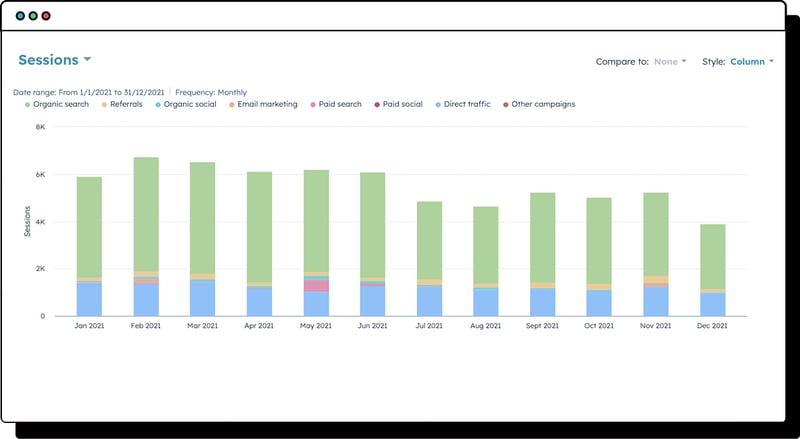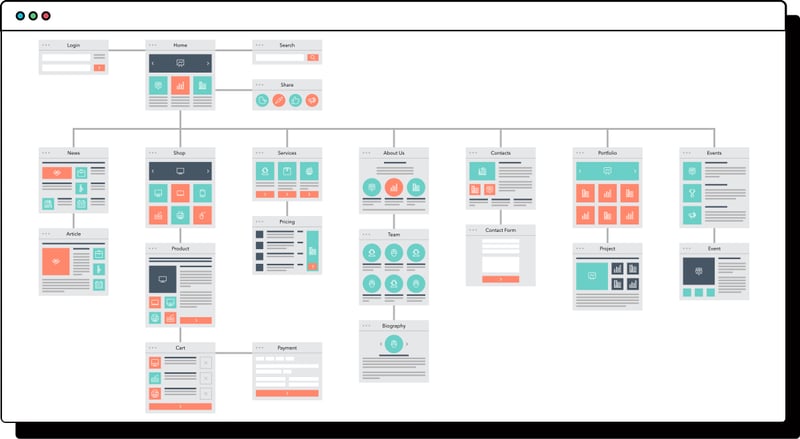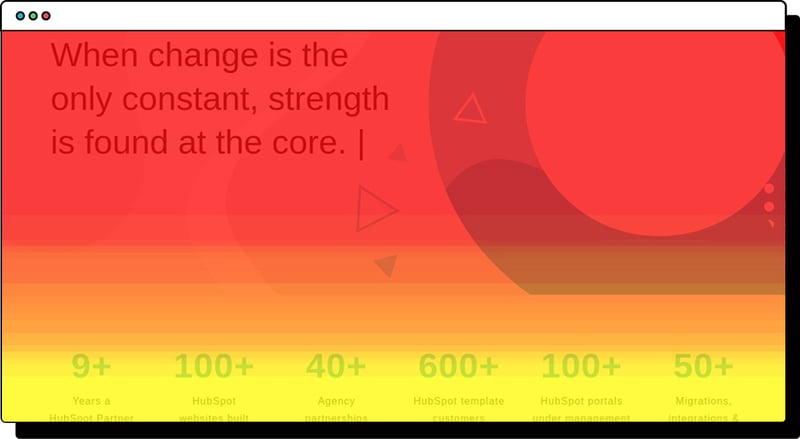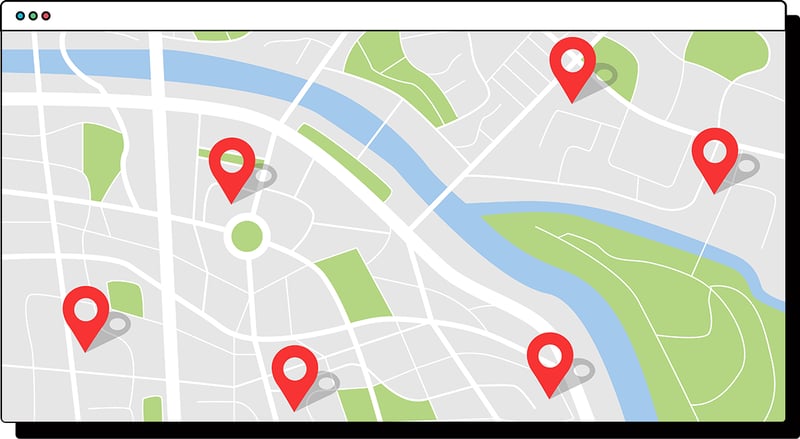Gaining a deep understanding of website analytics is essential for optimising user experience and achieving meaningful results.
By closely tracking your website's traffic, delving into visitor behaviour, thoroughly analysing page views, closely examining bounce rates, and carefully gathering demographic data, you will be able to tailor your marketing strategies and campaigns accordingly. This will lead to a significant improvement in the effectiveness of your website.
Let’s look at some of the types of website analytics that can help drive your decision making.
We've included this contents section so you can jump to the information you need quickly!
Traffic analyticsBehavioural analytics
Data analytics
Visitor activity analytics
UTM campaign analytics
Geo-location analytics
User device analytics
Browser type analytics
 Traffic analytics
Traffic analytics
Discover valuable insights about your website visitors through analytics
Organic traffic
Organic traffic refers to the visitors who find your website through search engine queries, and it is an indicator of the success of your website and online presence.
According to the Brightedge Report on organic search ‘53.3% of all website traffic comes from organic search’ so this is one of the key traffic sources to pay attention to.
Measuring organic traffic allows you to understand the effectiveness of your SEO (Search Engine Optimisation) strategies and tailor your marketing efforts accordingly.
Furthermore, tracking the sources of organic traffic can help you identify which channels are performing well and invest more resources in those areas.

Referral traffic
Referral website traffic refers to the visitors who come to your site from other websites, rather than directly typing in your URL or finding you through search engines.
This type of traffic is important because it can bring in new visitors who may not have otherwise discovered your website.
When analysing referral traffic, you can gain valuable insights into the sources that are sending visitors to your site. This data allows you to understand which channels are most effective in driving traffic and which ones may need improvement.
By leveraging the power of referral traffic analysis, you can attract more visitors to your website and achieve greater success in your marketing endeavours.
Organic social traffic
Organic social traffic refers to the visitors that come to your website through social media platforms rather than through paid promotions or ads. This type of traffic is driven by the organic reach of your social media posts, where users see and engage with your content naturally.
Organic social traffic is highly valuable as it indicates that users are genuinely interested in your brand and content, leading to higher engagement and conversions.
By sharing valuable and engaging content on your social media channels, you can attract organic social traffic and increase your website's visibility and rankings in search engine results.

Traffic from email marketing
By understanding the effectiveness of your email campaigns, you can make informed decisions to optimise your marketing strategy.
One way to analyse website traffic from email marketing is by tracking the click-through rates. This metric helps you measure the number of users who click on the links within your emails and subsequently visit your website. By monitoring this data, you can identify which emails are driving the most traffic and tailor your future campaigns accordingly.
Paid search traffic
Paid search traffic is a key component of any successful online strategy. With paid search, you can target specific keywords and demographics, ensuring that your ads are seen by the right audience at the right time. By conducting thorough keyword research and crafting compelling ad copy, you can maximise your visibility in search engine results and attract high-quality traffic to your site.
By constantly monitoring and optimising your paid search efforts, you can continuously improve your visibility, increase your website traffic, and drive more conversions for your business.
Direct traffic
Direct website traffic refers to the visitors who come directly to your website by typing your URL into their browser or clicking on a bookmark. Unlike other sources of traffic, direct traffic is highly valuable because these visitors already have an awareness of your brand and are actively seeking out your website.
Direct Traffic is also a catchall if the source is unknown. This can happen if the website visitor doesn't accept cookie tracking.
You may occasionally see more direct traffic in your sources report than expected and it is worth checking out the reasons for this.
Using the insights provided by direct website traffic analytics, you can enhance your website, elevate user experience, and boost conversion rates.

Traffic from other campaigns
By analysing data from other campaigns, you can gain valuable insights into what works and what doesn't. For instance, by examining past campaign performance, you can identify the channels and tactics that yielded the highest return on investment.
Data from other campaigns can uncover patterns and trends in customer behaviour, enabling you to tailor your messaging and targeting more effectively.
Overall, leveraging analytics from other campaigns can help you maintain a competitive advantage, enabling you to make informed decisions and continuously refine your marketing approach for maximum impact.
Tools such as HubSpot’s Traffic Analytics with its intuitive interface and user-friendly features helps you visualise the data and provides a comprehensive overview of your website traffic sources.

 Behaviour analytics
Behaviour analytics
Behavioural analytics allows businesses to gain valuable insights into customer behaviour and preferences.
With behavioural analytics, you can track and measure key metrics such as click-through rates, conversion rates, and user engagement, providing a deeper understanding of your target audience.
Understanding customer behaviour patterns helps tailor your marketing strategies, personalise user experiences, and drive higher customer satisfaction and loyalty allowing you to stay ahead of the competition.
Using tools such as HubSpot’s Custom Behavioural Events you can create personalised events that monitor and track the activity of your website or app visitors. By evaluating the impact and effectiveness of these events and campaigns, you will gain valuable insights to guide you when crafting future campaigns.

Page views
By analysing the number of website page views, you can gain valuable insights into your audience's behaviour and preferences. This data allows you to identify the most popular and valuable pages on your site and understand which content resonates best with your audience.
Page views by session
The page views by session analytics. This metric holds the key to understanding how visitors interact with your website and the overall user experience it delivers. Keeping track of the number of pages viewed per session allows you to delve deeper into user behaviour, identify the most popular pages, and optimise your content accordingly. Bounce rates
Bounce rates refer to the percentage of visitors who leave your site after viewing only one page, without making an interaction of some kind. It is a clear indication of user engagement and whether your content is resonating with your target audience.
According to a HubSpot Survey of over 400 web traffic analysts, “the majority (43.8%) had a bounce rate between 21-40%."
Even though bounce rates vary widely and will differ depending on your industry, it is an important metric to track.
By analysing bounce rate data, you can gain valuable insights into the user experience and identify areas for improvement on your website. This includes optimising page load speed, improving content relevance, and enhancing overall site navigation.
.png?width=41&height=42&name=documents%20icon%20blue-min%20(1).png) Data analytics
Data analytics
Gather demographic data, understand user engagement, measure conversion rates.
Demographic data:
Demographic data plays a key role in understanding the characteristics of a specific population.
By analysing demographic data, you can gain valuable insights into your target audience and their browsing and buying habits.
With the help of advanced analytics tools such as Google Analytics, you can dive deep into demographic data to uncover hidden patterns and trends
Moreover, demographic data insights and analytics also helps identify new market opportunities, understand consumer preferences, and improve overall business performance.

Measure conversion rates:
When it comes to defining conversions, there are several types that can be considered. From sales and sign-ups to downloads, each conversion holds its own significance in measuring the success of a website or online campaign.
Setting conversion goals is crucial as it helps determine what actions you want your audience to take; from making a purchase, subscribing to a newsletter, or downloading an eBook.
A high conversion rate indicates that your website or campaign is successful in persuading visitors to take the desired action, while a low conversion rate may indicate the need for improvements or optimisations.
Monitoring and measuring conversion rates is an essential part of any SEO strategy as it provides valuable insights into user behaviour and helps you refine tactics to achieve better results.
1. Session to contact rate
The session-to-contact rate represents the percentage of website sessions that result in a contact or lead being made. A high session-to-contact rate indicates that a website is effectively engaging its visitors and converting them into potential customers.
If you find that your session-to-contact rate is below what you are expecting, look at ways to optimise your website's user experience; ensure it is easy to navigate and has clear calls to action.
By carefully monitoring and analysing this data, you can uncover valuable insights into your website's performance and increase conversion rates.
2. Contact to customer rate
Contact-to-customer rate refers to the percentage of contacts that convert into paying customers.
By delving into the rate at which contacts translate into actual customers, you can gain valuable insights into the effectiveness of your marketing campaigns and identify areas for improvement.
 Visitor activity analytics
Visitor activity analytics
Learn how, and from where, your visitors interact with your website
Monitoring website navigation
By keeping a close eye on how users navigate around your website, you can uncover valuable insights into their behaviour and preferences.
This information can help you optimise your site's navigation structure, ensuring that visitors can easily find what they are looking for. Regular monitoring allows you to identify any bottlenecks or issues in your navigation flow and promptly address them. Additionally, it enables you to track the effectiveness of any changes or updates you make to your website's navigation.
With continuous monitoring, you can ensure that your website is user-friendly, intuitive, and provides a seamless browsing experience for your audience.

Tracking clicks and scroll depth
Tracking clicks and scroll depth is an essential aspect of search engine optimisation (SEO) that can enhance the performance and visibility of your website.
Monitoring the clicks made by users on your website can help you make informed decisions on how to optimise your content and improve user experience.
Additionally, tracking scroll depth allows you to understand how far users are scrolling down your web pages, indicating whether they are engaged with your content or not. This information is crucial for optimising your page layout and ensuring that your most valuable information is visible to your audience.
Tools, such as Hotjar can help you understand how your visitors interact with your site. Hotjar offers a range of tools, including heatmaps, visitor recordings, and conversion funnels, that allow you to see exactly how users navigate your site and where they encounter any issues.

Session duration
Session duration analytics convey how long visitors stay on your website, which pages they navigate to, and what actions they take.
Longer session durations indicate that visitors are engaged and find value in the content, while shorter durations may suggest a need for improvement. Session duration analytics can help shape decisions to enhance user experience, increase conversions, and boost SEO efforts.
Average session length
Measuring the duration of each user's visit indicates how long your audience is engaged for in a single session and how long your content is retaining their attention for.
With the help of analytics tools, such as Google Analytics, you can track the average session length and identify any patterns or trends that may impact your website's performance.
Optimising content and user experience based on these analytics, can help to improve average session length, enhance your website's engagement, and drive better results.
 UTM campaign analytics
UTM campaign analytics
UTM campaign analytics is essential for maximising online marketing efforts.
By using UTM parameters in campaign URLs you can track and analyse campaign effectiveness in real-time and gain insights into the channels and campaigns driving the most traffic, conversions, and revenue.
UTM campaign analytics helps you to unlock the potential of online marketing and stay ahead in the digital landscape.
 Geo-location analytics
Geo-location analytics
Geo-location analytics gives you valuable insights into your customer base and helps you understand where your customers are located.
By analysing the geographic location of your customers, you can identify trends, patterns, and preferences to help inform your marketing campaigns and strategies.
This can help you optimise areas such as store locations, distribution routes, and target specific regions with tailored advertising.

Using IP addresses for geolocation
Geolocation identifiers in the shape of IP addresses not only provide the location of an internet user but also help tailor marketing strategies to specific areas, countries, or target audiences.
By analysing IP addresses, you can gain insights into the geographical distribution of your website visitors, allowing you to make decisions on how to optimise your online presence.
 User device analytics
User device analytics
By tracking the types of devices used to access your site can help you optimise your website for better user experience, as well as make informed decisions about your marketing and advertising strategies.
With user device analytics, you can identify trends, such as the increasing use of mobile devices, and tailor your website to accommodate these changes. By ensuring that your site is mobile-friendly, you can improve your search engine rankings and attract more organic traffic.
 Browser type analytics
Browser type analytics
Analysing the different browsers used by visitors to your website, helps drive website design and functionality, ensuring a seamless user experience across all browsers.
Whether it's Chrome, Firefox, Safari, or Internet Explorer, understanding the browser preferences of your target audience allows you to tailor your content and optimise your website for maximum visibility and engagement. With browser type analytics, you can stay one step ahead of the competition and enhance your website's performance in search engine rankings.

Conclusion
Tracking and analysing your website's traffic and visitor behaviour can enhance the effectiveness of your marketing strategies. By understanding your audience's demographics and preferences, you can tailor your campaigns to better reach and engage them.
This data-driven approach allows you to make informed decisions and optimise your website for improved results. So don't hesitate to dive into the world of analytics and let it guide you towards a more successful online presence. Start tracking today and unlock the potential for growth and success.
Next steps
Are you ready to dive into the world of analytics? Get in touch today for a free website health check.
